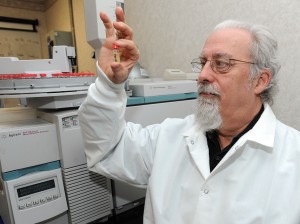 Dr. J. Graham Rankin, professor of the Marshall University forensic science graduate program, presented research results to develop a field method for identifying the hallucinogenic herb Salvia divinorum Sept. 12 at Indiana University-Purdue University Indianapolis.
Dr. J. Graham Rankin, professor of the Marshall University forensic science graduate program, presented research results to develop a field method for identifying the hallucinogenic herb Salvia divinorum Sept. 12 at Indiana University-Purdue University Indianapolis.
Rankin presented the seminar to students and faculty of the forensic chemistry program within the Department of Chemistry and Chemical Biology at IUPUI as part of its regular seminar series.
Forensic chemistry graduate students in Marshall’s graduate program conducted the research for the field method using Attenuated Total Reflectance Infrared Spectroscopy (ATR-IR) technology. Begun in 2010, graduate student research on the project will continue for at least another year with analysis of more than 500 more samples representing more than 300 species of Salvia.
Salvia divinorum is becoming more prevalent, especially among college students, because it is legal in most states, and a recent law signed by President Obama in July made many of the common synthetic cannabinoids (“Spice” products) illegal. It is commonly smoked like marijuana and is said to give a marijuana-like high although it contains a different hallucinogen from marijuana or Spice products. It has few distinguishing botanical characteristics unlike marijuana and no simple color test that can be performed at the time of seizure. Thus, a simple screening test is needed.
ATR-IR instruments are now being used in the onsite investigation of meth labs, and many law enforcement agencies have this equipment available for other uses.
Graduates of Marshall’s graduate program who contributed to the research previously were Elise Chom and Rebecca Mead. Forensic science graduate students currently working on the research are Shaina Chang, Michelle Ball and Matt Brewer.
A manuscript based on this work has been submitted to the Journal of Forensic Science for publication. The manuscript is currently in the peer review process.







